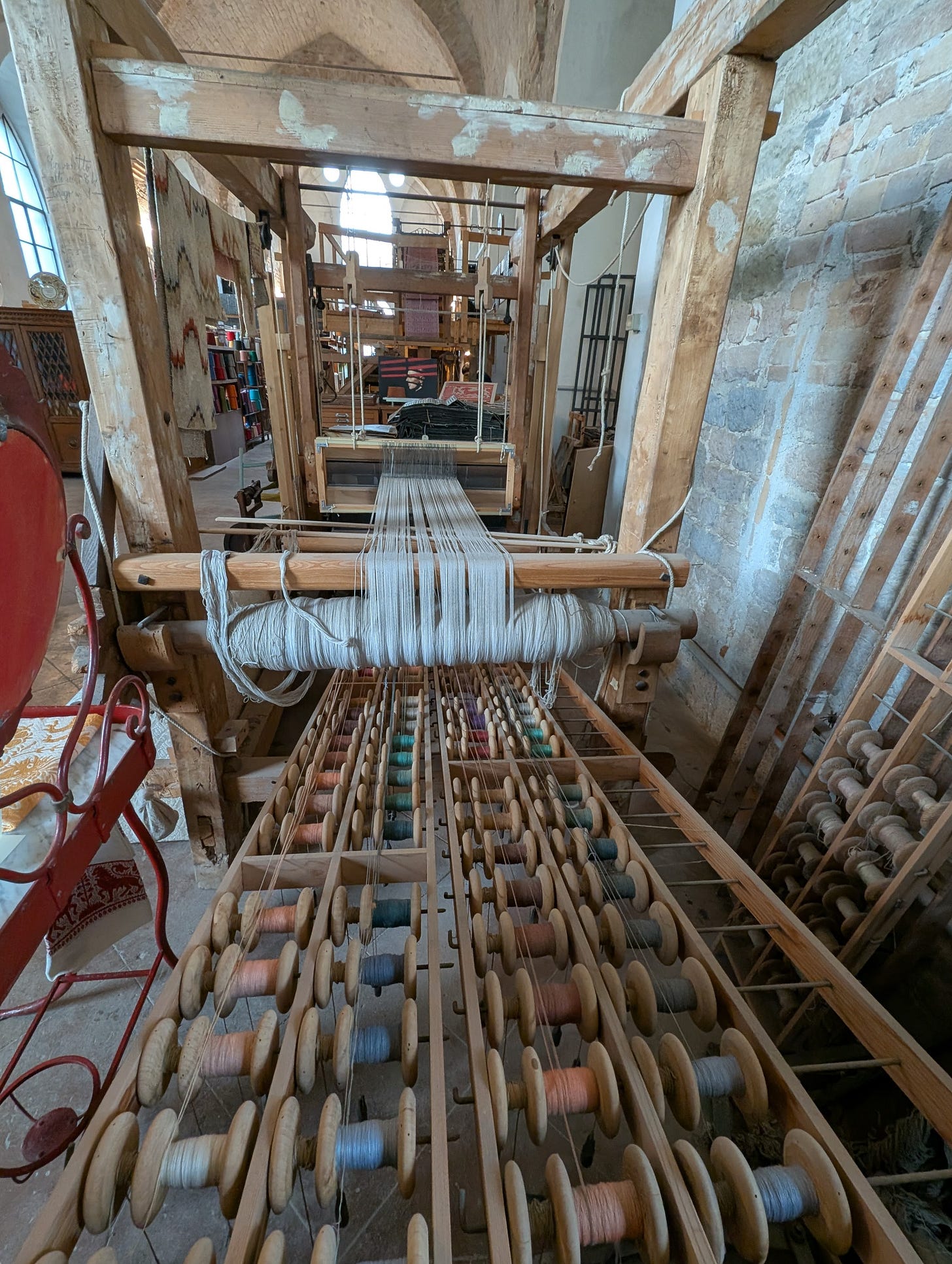I recently met a friend with an excellent book idea, including a delightful means of organization. Her idea seemed powerful, instantly provoking my ideas and comments. My friend energetically defended her concept, too, blowing past my kibbitz. The way she was thinking about her subject, the thing she alone could write, was a healthy obsession.
That’s a good sign. Figuring out what to write and how to write it is like pulling on threads. When you research a subject for a captivating tale, every promising idea, every intriguing detail, every nagging question raised by what you learn, is like a loose thread you’re pulling on.
Most are thin and useless. A few grow, as you learn more interesting details, then dwindle away into something limited or ordinary. At last there’s the lucky thread that gets more dense and colorful as you pull on it, until you have enough material to weave something useful. You stay interested, and your interest can turn into something great. And at that point, you won’t stop. My friend clearly has something good, an idea that seems like it will continue to yield material.

Threads are essential, and finding the right one is often memorable. One of my favorites emerged suddenly, then developed slowly. It was the day that Ted Kaczynski, aka the Unabomber, was captured in the town of Lincoln, MT. At that time I was at the San Francisco bureau of the Wall St Journal, and I had gone to eastern Washington to investigate a tip that the Unabomber lived among a mountain of hermits near the Idaho border.1 My editors roped me in to get whatever local Unabomber color I could find.
There are a few sources reporters use to get a quick feel for a place. Cab drivers (when they existed) go all over a town with all kinds of people in various emotional states. Because they converse with strangers all day they can be good at small talk. Bartenders see a lot of the town while standing in one place, and over increasingly lubricated hours they hear and see much more than you get on a cab ride. Plus, you can drink while you talk with them, which much of the press enjoys.
I always talked with local librarians. Like bartenders, they stay in one place and observe much of the town around them. And their view also includes kids, old people, migrants receiving social services, and other people who tend not to be in the town bar. Folks gossip while they check out books, so librarians hear the small-town politics and the salacious stuff, too. They’re educated, and as a rule they read a lot and develop decent imaginations, so they’re good at description. Not only that, other reporters don’t often think to talk to them.
I struck absolute gold with the librarian in Lincoln. When Kaczynski wasn’t in his windowless cabin building artisanal bombs, he was reading at the library. Given his poverty, his crap bicycle, and his unkempt looks, the townspeople thought he was ignorant. In fact, he was requesting books in three languages, in a broad range of difficult subjects.2
For a librarian who spent most of her time lending out lightweight popular fiction, he was exceptional. By law,3 she couldn’t tell anyone he was brilliant. Not only that, he often sat reading for hours nearby, almost always a comforting act, and he befriended her young son, giving him math puzzles. They were close.
The day I called Lincoln, her ideal of Ted had utterly collapsed. Not only that, a very friendly and intelligent Forest Service employee, who’d been visiting over the past several weeks to look at USGS maps and chat for hours, turned out to be an FBI agent keeping an eye on Ted.
I happened to call her a couple of hours after Kaczynski’s arrest. She didn’t tell me much about her relationships with the people involved, but she sounded disoriented. After talking a bit about the town, she guardedly mentioned Ted and the FBI guy and said, “Right now, I feel like I don’t know anybody.”
How much we trust people without really knowing them is a profound thing, and maybe that’s what made it seem like a good thread to follow. At the same time, her own vulnerability, and what she telegraphed about needing to rebuild her world, meant she deserved a lot of respect. I talked with her, off and on, for more than a year, until she invited me to come up and hear her whole story. You can read it here (requires a WSJ subscription, sorry.) I’m pleased to say she liked the piece.
It’s partly a story about the town, and partly about her education in deception and loyalty. She still loved (in a sisterly way) the Ted she’d known, and allowed her son to keep up correspondence with him while he awaited trial. The friendship they’d known somehow existed apart from the crimes. At the same time, as a believer in the death penalty, she told me towards midnight, if he was convicted of murder, he deserved to die. Often a tragedy is that both things are true.
It was a story about deception and loyalty, about his obsessions and her curiosity about him, about a town cashing in on whatever it could from its momentary notoriety, and about searching for some kind of certainty, when you feel like you don’t really know anyone. The first thread though, that was just a few words.
—-------------
You could call that my own curiosity about what she’d said. I couldn’t stop thinking about what would happen next. The best sign of a strong thread is, Does it sustain your curiosity, or lead you down interesting new areas of investigation? As you pull on it, as you grow more curious, do your feelings deepen?
This is also, by the way, the basis of excellent advice for a young person trying to figure out what to do in life: Find out what makes you curious, and the things that lead to more curiosity as you investigate them. You’ll learn a lot about subjects you care about, maybe become some kind of expert and get paid, or at least spend your time doing something that engages who you truly are.
Taken to extremes, of course, extreme curiosity is another word for “obsession.” That can be a useful trait for writers, particularly if they are able to walk away from it. At some point, the work must be abstracted from the personal to something a lot of people can appreciate.
Obsession is certainly an excellent thing to discover in a person you’re writing about. An astonishing number of great nonfiction books, in Business, Science, Politics, you name it, are in some form or other stories of an obsession. In most of the work by Michael Lewis, Susan Orlean, or John McPhee, there’s a character who can’t stop thinking about something (a screwy housing market, orchids, geology), staring at it, and trying to figure out even more about it. Often they are curious to a point where they shut out much of the normal world, living what to the non-obsessed consider an odd life.
Investigating such a quest is the means by which a good writer tells you much more about the world.
And people love reading about the obsessed, to a point that justifies the writers’ own curiosity, and raises the question of why obsession attracts readers. Do we care about obsession simply because we’re raised on quest stories, and obsessed people are all in search of a crazy grail? That seems too circular and unsustaining.
A quest is usually a series of difficulties faced, understood, and overcome. Without challenges, a quest is just a trip to see a dead dragon. In that way, somewhat like detective stories, the modern problem/resolution story we love indulges the idea that in the chaos of the world cleverness will get us through. The obsessed characters become heroic because they overcome things, even if their final objective is, in the eyes of the world, somewhat loony. And we admire their heroism.
I think it’s there’s something else, too. Obsession grants certainty. Most of us lead diffuse and confused lives, with contending demands and oscillating conviction about what, exactly, we should be doing anyway. The obsessed person seems free of doubt. Their commitment to any single thing is seductive to the observer.
At least, when its not taken to Kaczynski-level psychopathic craziness. But even then, not everyone stops. Between his 1996 arrest and his suicide in jail two years ago this month, he was said to have corresponded with over 400 people, many of whom, I suspect, found some kind of attractive certainty in his obsessive madness.
The tipster thought he’d seen hand-drawn schematics of a commercial jet in an abandoned trailer. We located the trailer after several hours of scouting among the hermits; it had been transported to the backyard of a very reclusive and scary guy who told us we had “a tiger by the tail.” There were indeed drawings inside the wreckage, but they were utter madness, from the pen of someone who believed they were in touch with intelligent space lizards. No tiger, no tale.
I was never able to find out which languages, see the next footnote. I suspect one was German.
During Robert Bork’s confirmation hearing to be a Supreme Court justice, an enterprising reporter went to Bork’s local video rental store and asked to see what movies he’d rented. Safe to assume the reporter was looking for porn. No such luck, it was mostly G-rated stuff. Still, a story was written about his private tastes. Incensed, lawmakers made it illegal for such establishments, and libraries, to reveal what their patrons checked out. Damn right too.




